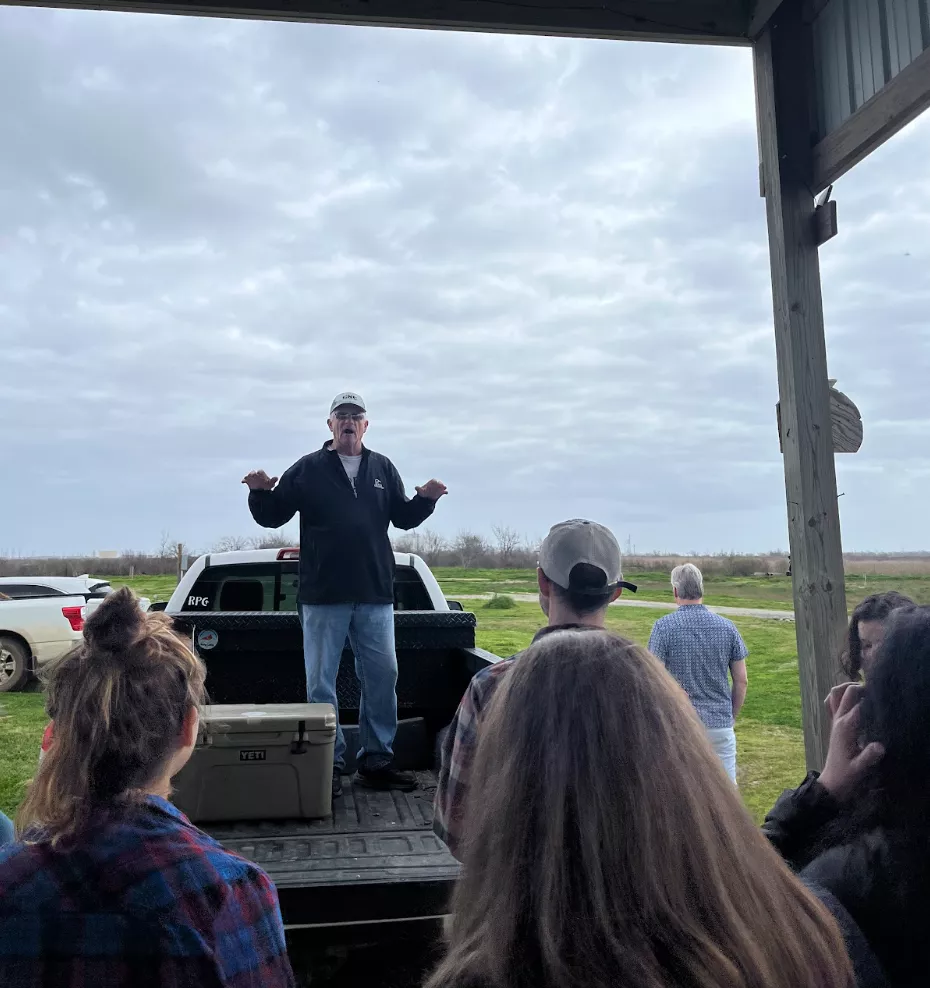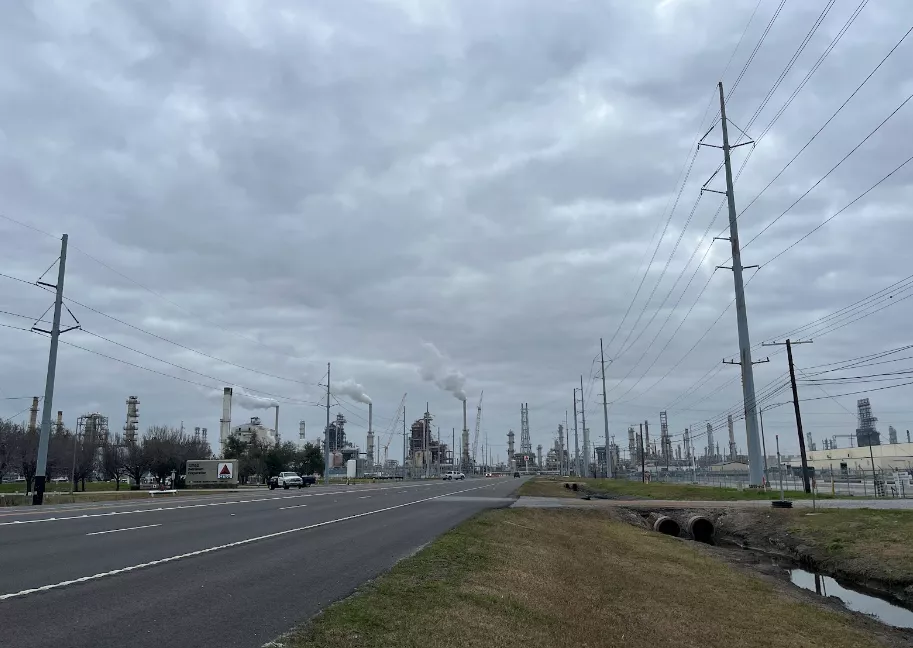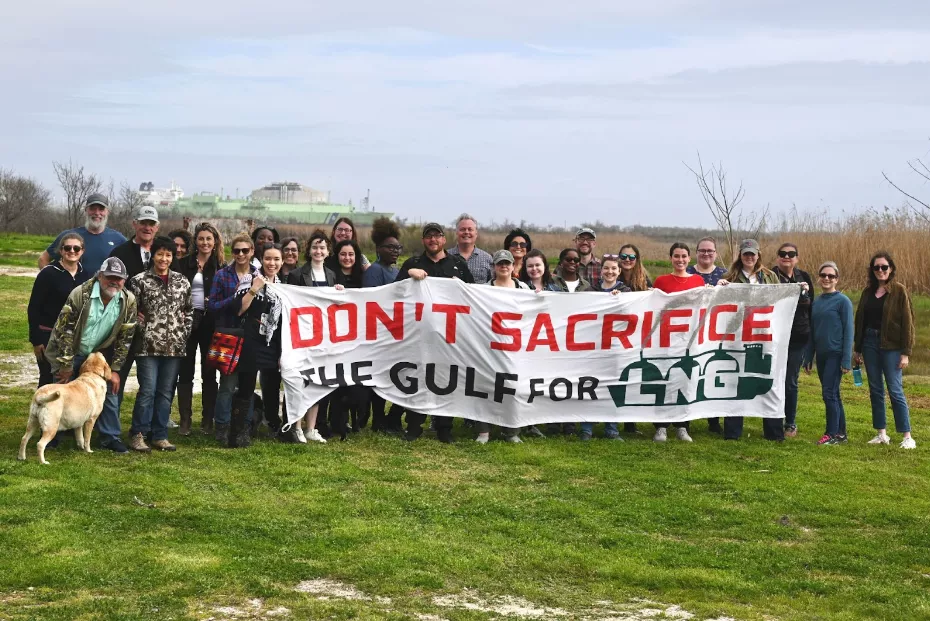In February, I found myself on John Allaire’s beautiful wetland property in Cameron Parish, Louisiana, enjoying a shrimp boil with frontline organizers and members of a coalition fighting the expansion of liquefied methane gas, known as LNG, exports from all over the country whom I had never before met outside of a Zoom screen. John is an engineer turned advocate who is working to protect his home and community, and brought us all together to show us the impacts of LNG firsthand.

As his two dogs sprinted around greeting each of us, John explained the complex ecosystem of the ancient gulf beach ridges we stood near, called cheniers, that only exist in this part of Louisiana. We followed the salty breeze down a short path leading us to the Gulf of Mexico, where we combed the shore for frosty, colorful pieces of sea glass and spiraling seashells. In the distance, a massive tanker came into view, headed to refuel at the Calcasieu Pass LNG export terminal just hundreds of feet away before going back overseas. The tanker and flaring infrastructure looming near served as a constant reminder of what brought us there- to observe firsthand the massive expansion of fossil fuel infrastructure that is actively harming Gulf communities, ecosystems, and futures.
This coalition trip to Southwest Louisiana had been planned since early January, just weeks before the Biden administration announced a pause on all new and pending applications to export US-sourced fracked gas to non-Free Trade Agreement countries while the Department of Energy updates the analyses used to determine whether LNG exports are in the “public interest,” a determination required under the Natural Gas Act.
DOE’s temporary pause is intended to give the agency the opportunity to conduct a robust analysis that fully accounts for all impacts of LNG exports along the entire supply and delivery chain. Despite the mandate to evaluate the impacts of gas exports on the public, this full analysis, from the well to the end use, has never been fully considered before. Additionally, it’s a chance to take a close look at the environmental justice implications of LNG exports for the first time, including assessing the risk of these facilities exploding within a dangerous range to residential areas and the negative health impacts faced by communities disproportionately exposed to pollutants associated with producing LNG.

While the Administration’s decision is an important step towards protecting additional communities from being inundated with the harmful impacts of new LNG export infrastructure, existing and approved LNG terminals will continue to operate throughout the pause and beyond, with a projected threefold increase in our export capacity by 2030. This explains why the fossil fuel buildout and pollution in Southwest Louisiana was the same during my mid-February trip as it was before the pause, and why community members located near the operating and approved terminals, such as John Allaire, won’t get relief anytime soon. As he and other frontline folks continue to gather evidence of the harms of LNG export terminals such as persistent flaring, ecosystem degradation, and chronic illness, I have taken my experiences during this visit back home with me to apply to my work on the Hill in Washington DC.
Since the pause was announced, House Republicans have wasted time proposing harmful pro-LNG legislation and holding misinformed hearings rather than focusing on passing critical bipartisan funding legislation. Notably, they passed H.R. 7176, which would revoke the Department of Energy’s well-established authority and long-standing responsibility to ensure new LNG exports are in the public interest in favor of unfettered fossil fuel expansion.
With these actions, Republicans have shown they favor polluters over people. The folks who gathered with John, and communities across the Gulf have been putting up a constant effort to ensure the facts around LNG exports and the Administration’s pause are kept straight. Despite the opposition by fossil fuel-supporters, we have many allies in Congress who are willing to stand up to polluters to protect the health and future of local communities, and who understand the broader climate and price impacts of gas exports.
The pause can not be the end of the road, though. We must have meaningful action. Sierra Club just joined more than 100 other organizations in telling the DOE what must be part of the review process happening during the pause. If done right, the pause should lead to the rejection of applications for gas exports because they are not in the public interest.
Our regular coalition calls with frontline organizers located in the Gulf Coast have felt more powerful now that we share memories from our time in person, and I feel confident that collectively we will make sure these harms don’t happen to another community ever again. Now more than ever, we know what we are fighting for and we won’t let up the pressure.

